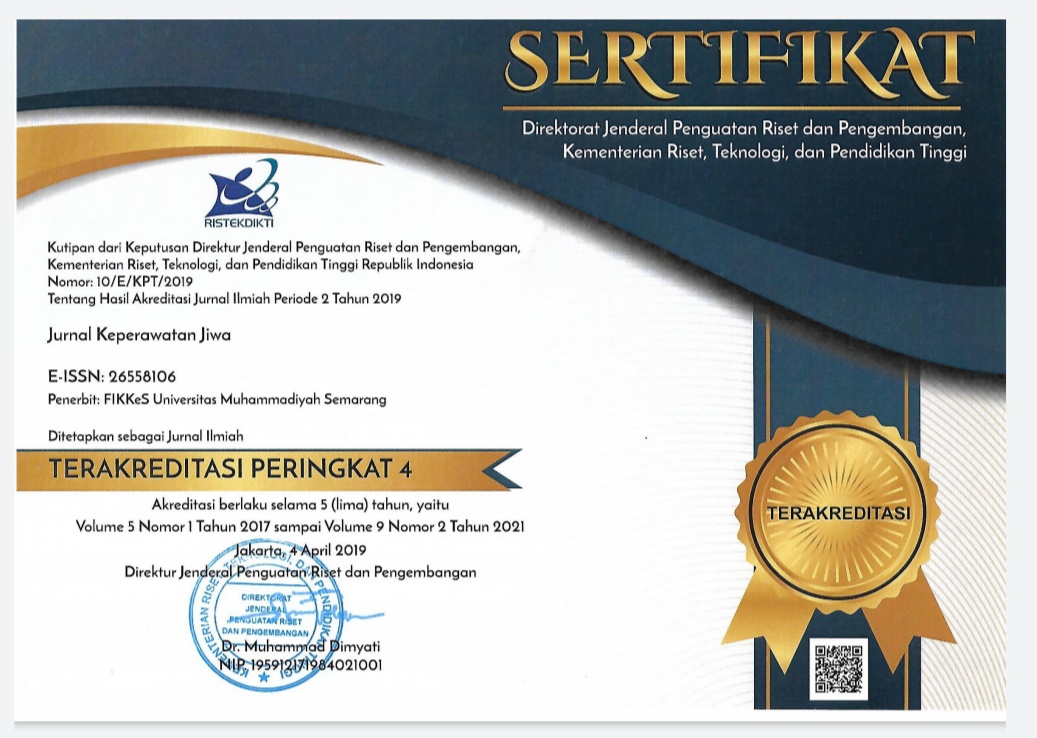Smartphone Addiction dengan Depresi, Kecemasan dan Stres pada Mahasiswa
(1) Program Studi S1 Keperawatan, Fakultas Keperawatan dan Kebidanan, Universitas Nahdlatul Ulama Surabaya
(2) Program Studi S1 Keperawatan, Fakultas Keperawatan dan Kebidanan, Universitas Nahdlatul Ulama Surabaya
(3) Program Studi S1 Keperawatan, Fakultas Keperawatan dan Kebidanan, Universitas Nahdlatul Ulama Surabaya
(4) Program Studi D3 Keperawatan, Fakultas Keperawatan dan Kebidanan, Universitas Nahdlatul Ulama Surabaya
(5) Program Studi D3 Keperawatan, Fakultas Keperawatan dan Kebidanan, Universitas Nahdlatul Ulama Surabaya
(*) Corresponding Author
Abstract
Kecanduan smartphone merupakan perilaku adiktif, hilangnya kontrol diri akibat obsesi berlebihan terhadap penggunaan smartphone. Penggunaan smartphone secara berlebihan menyebabkan masalah psikologis seperti depresi, kecemasan dan stres. Penelitian ini bertujuan untuk menganalisis hubungan antara kecanduan smartphone dengan depresi, kecemasan dan stres pada mahasiswa. Penelitian ini merupakan penelitian korelasional non eksperimental dengan pendekatan cross sectional. Teknik pengambilan sampel adalah simple random sampling dengan jumlah sampel 122 orang mahasiswa Nahdlatul Ulama Surabaya. Variabel bebas dalam penelitian ini adalah kecanduan smartphone yang diukur dengan menggunakan Smartphone Addiction Scale Short Version (SAS-SV) sedangkan variabel terikatnya adalah depresi, kecemasan dan stres yang diukur dengan Depresi Anxiety Stress Scale (DASS 21). Analisis data menggunakan rho-spearman. Hasil penelitian menunjukkan hubungan yang signifikan dengan p-value 0,000 (p<0,005). Kecanduan smartphone memiliki hubungan positif dengan depresi, kecemasan dan stres pada mahasiswa.
Keywords
Full Text:
PDFReferences
Abid, U., Khan, T. J., Sheikh, A., Saleem, S., Kayani, H. A., & Habib, M. A. (2020). The relationship between smartphone addiction and depression among university students in Karachi: a cross-sectional study. International Journal Of Community Medicine And Public Health, 7(9), 3472. https://doi.org/10.18203/2394-6040.ijcmph20203909
Alhassan, A. A., Alqadhib, E. M., Taha, N. W., Alahmari, R. A., Salam, M., & Almutairi, A. F. (2018). The relationship between addiction to smartphone usage and depression among adults: A cross sectional study. BMC Psychiatry, 18(1), 4–11. https://doi.org/10.1186/s12888-018-1745-4
Ayandele, O., Popoola, O. A., & Oladiji, T. O. (2020). Addictive use of smartphone, depression and anxiety among female undergraduates in Nigeria: a cross-sectional study. Journal of Health Research, 34(5), 443–453. https://doi.org/10.1108/JHR-10-2019-0225
Chiu, S. I. (2014). The relationship between life stress and smartphone addiction on taiwanese university student: A mediation model of learning self-Efficacy and social self-Efficacy. Computers in Human Behavior, 34, 49–57. https://doi.org/10.1016/j.chb.2014.01.024
Demirci, K., Akgönül, M., & Akpinar, A. (2015). Relationship of smartphone use severity with sleep quality, depression, and anxiety in university students. Journal of Behavioral Addictions, 4(2), 85–92. https://doi.org/10.1556/2006.4.2015.010
Gligor, Șerban, & Mozoș, I. (2019). Indicators of smartphone addiction and stress score in university students. Wiener Klinische Wochenschrift, 131(5–6), 120–125. https://doi.org/10.1007/s00508-018-1373-5
Hawi, N. S., & Samaha, M. (2017). Relationships among smartphone addiction, anxiety, and family relations. Behaviour and Information Technology, 36(10), 1046–1052. https://doi.org/10.1080/0144929X.2017.1336254
Jocelyne Matar Boumosleh, D. J. (2017). Depression, anxiety and smartphone addiction in university students- A cross sectional study. PLOS ONE, 1, 214–222.
Kim, S. G., Park, J., Kim, H. T., Pan, Z., Lee, Y., & McIntyre, R. S. (2019). The relationship between smartphone addiction and symptoms of depression, anxiety, and attention-deficit/hyperactivity in South Korean adolescents. Annals of General Psychiatry, 18(1), 1–8. https://doi.org/10.1186/s12991-019-0224-8
Langi, N. G. T. ; G. D. K. ; F. L. F. . (2019). Hubungan Antara Kecemasan Dengan Adiksi Smartphone Pada Mahasiswa Fakultas Kesehatan Masyarakat Universitas Sam Ratulangi Manado. Kesmas, Universitas Sam Ratulangi Manado, 8(2), 1–6.
Mohamed, S. M., & Mostafa, M. H. (2020). Impact of smartphone addiction on depression and self-esteem among nursing students. Nursing Open, 7(5), 1346–1353. https://doi.org/10.1002/nop2.506
Primadiana, D. B., Nihayati, H. E., Wahyuni, E. D., & Keperawatan, F. (2019). HUBUNGAN SMARTPHONE ADDICTION DENGAN KECEMASAN SOSIAL PADA REMAJA (Relationship between Smartphone Addiction with Social Anxiety in Adolescents) KONTAK PENULIS. E-Journal Unair, 1(1), 21–28. http://e-journal.unair.ac.id/PNJ%7C21JournalHomepage:https://e-journal.unair.ac.id/PMNJ/index
Ramaita, R., Armaita, A., & Vandelis, P. (2019). Hubungan Ketergantungan Smartphone Dengan Kecemasan (Nomophobia). Jurnal Kesehatan, 10(2), 89. https://doi.org/10.35730/jk.v10i2.399
Sangam, S., Naveed, A., Athar, M., Prathyusha, P., Moulika, S., & Lakshmi, S. (2015). International Journal of Health Sciences and Research. 5(1), 156–164.
Stanković, M., Nešić, M., Čičević, S., & Shi, Z. (2021). Association of smartphone use with depression, anxiety, stress, sleep quality, and internet addiction. Empirical evidence from a smartphone application. Personality and Individual Differences, 168(August 2020), 110342. https://doi.org/10.1016/j.paid.2020.110342
Article Metrics
Abstract view : 1195 timesPDF - 272 times
DOI: https://doi.org/10.26714/jkj.9.4.2021.947-954
Refbacks
- There are currently no refbacks.

This work is licensed under a Creative Commons Attribution 4.0 International License.
Statcounter
PPNI Univ. Muhammadiyah Semarang
Jl. Kedungmundu Raya No. 18 Semarang Gedung NRC University of Muhammadiyah Semarang
Phone: 02476740287
Fax: 02476740287
Email: jurkep.jiwa@gmail.com
This work is licensed under a Creative Commons Attribution 4.0 International License.


